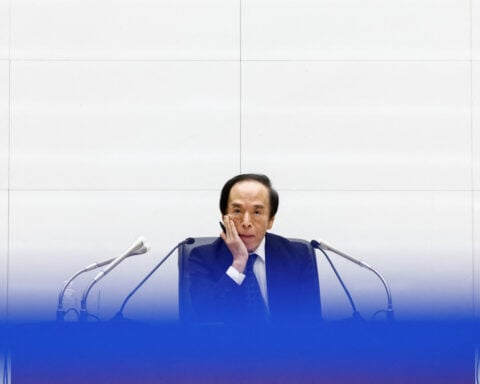By Douglas Gillison
(Reuters) - Staff trust in the Federal Deposit Insurance Corporation's leadership has fallen sharply to well below government averages, with a growing number of workers considering leaving the agency, the latest FDIC staff survey data obtained by Reuters shows.
In 2023, 38% of FDIC staff were considering leaving within the next 12 months, more than double that of 2020, compared with only 33% government-wide, the data shows.
Only 39% of staff said FDIC leadership inspires strong "motivation and commitment," down from 61% in 2020 and 11 percentage points below the government average, the data obtained via the Freedom of Information Act showed.
The survey was conducted for the FDIC from Aug. 7 to Sept. 29, 2023 by the Office of Personnel Management, a U.S. agency which oversees civil servants and annually conducts worker surveys.
A damning independent review into FDIC misconduct published on Tuesday cited elements of the 2023 staff survey data. The agency has not released the full survey results.
The data provides more insight into the extent of low morale and staff disgruntlement at the agency where the potential for high staff turnover could threaten its ability to oversee lenders when many are struggling due to high interest rates.
An FDIC spokesperson said the survey was an "important tool" for measuring staff attitudes which informed FDIC recruiting and retention efforts, which had been improving over the last year.
The FDIC's internal watchdog warned in two recent reports that hiring remained below pre-pandemic levels and that high attrition rates could compromise "mission-critical" functions. Staff turnover contributed to failings in the FDIC's supervision of collapsed lender Signature Bank, an agency postmortem found.
"Higher attrition rates in 2021 and 2022 were directly related to the pandemic-related issues and a robust labor market and have since fallen to more historical levels," the FDIC statement said. Hiring of entry-level examiners last year was double that of 2021, it added.
Tuesday's report, sparked by a Wall Street Journal expose in November, revealed a culture that had tolerated sexual harassment, discrimination and other misconduct for years.
In recent years, the FDIC's handling of its return-to-office policy has been a major driver of discontent, said Vivian Hwa, president of the National Treasury Employees Union chapter representing workers at the FDIC's Washington headquarters. She said the FDIC began reneging in 2022 on an agreement to allow workers to report to the office on an as-needed basis.
Workers are often called to the office arbitrarily and with no clear business purpose, said Doreen Greenwald, national president of the National Treasury Employees Union.
More than 80% of employees who said they were considering leaving cited remote work arrangements as a factor.
According to the review of sexual harassment published on Tuesday, the return to office policy was a "particular point of dissatisfaction" among staff.
"It was the way they went about it, the fact that employees didn't feel they were consulted or had input into the process," Hwa said.
The proportion of staff who felt leadership involved them in decisions that affect their work lives fell to just 39% in 2023, down 17 points from 2020, the data showed.
The Journal expose also validated the view among many staff that FDIC bosses had not sufficiently addressed misconduct which likely contributed to the steady decline in ratings, Hwa added.
"People were aware of those issues for a long time. ... Over time, there were actions and behaviors on behalf of FDIC management which led to employees feeling they were not empowered," Hwa said.
The share of FDIC staff who said they felt management maintained "high standards of honesty and integrity" dropped to 56% from 74% in 2020. Only 52% of staff expressed a "high level of respect" for FDIC leadership, down from 73% three years earlier.
By comparison, the government average for both metrics has held steady at around 60% over the same period.
(Reporting by Douglas Gillison; Editing by Michelle Price and Richard Chang)

 Nippon Steel wants to work with Trump administration on US Steel deal, Mori tells WSJ
Nippon Steel wants to work with Trump administration on US Steel deal, Mori tells WSJ
 BOJ will raise rates if economy, price conditions continue to improve, Ueda says
BOJ will raise rates if economy, price conditions continue to improve, Ueda says
 Stock market today: Asian stocks mixed ahead of US inflation data
Stock market today: Asian stocks mixed ahead of US inflation data
 After cable damage, Taiwan to step up surveillance of flag of convenience ships
After cable damage, Taiwan to step up surveillance of flag of convenience ships
 As fires ravage Los Angeles, Tiger Woods isn't sure what will happen with Riviera tournament
As fires ravage Los Angeles, Tiger Woods isn't sure what will happen with Riviera tournament
 Antetokounmpo gets 50th career triple-double as Bucks win 130-115 to end Kings' 7-game win streak
Antetokounmpo gets 50th career triple-double as Bucks win 130-115 to end Kings' 7-game win streak
 Zheng loses to No 97 Siegemund, Osaka rallies to advance at the Australian Open
Zheng loses to No 97 Siegemund, Osaka rallies to advance at the Australian Open








